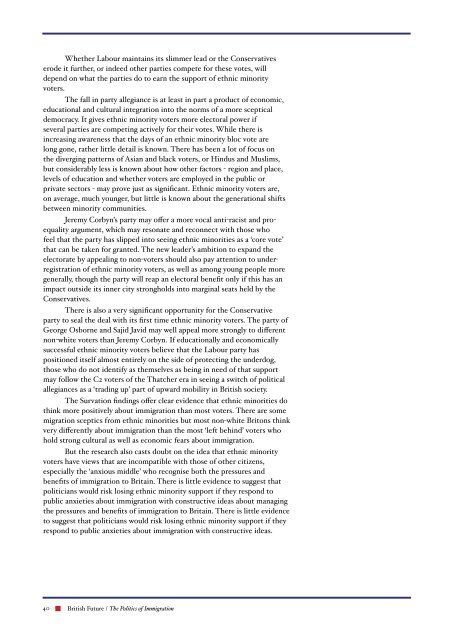THE POLITICS OF IMMIGRATION
The-politics-of-immigration
The-politics-of-immigration
Create successful ePaper yourself
Turn your PDF publications into a flip-book with our unique Google optimized e-Paper software.
Whether Labour maintains its slimmer lead or the Conservatives<br />
erode it further, or indeed other parties compete for these votes, will<br />
depend on what the parties do to earn the support of ethnic minority<br />
voters.<br />
The fall in party allegiance is at least in part a product of economic,<br />
educational and cultural integration into the norms of a more sceptical<br />
democracy. It gives ethnic minority voters more electoral power if<br />
several parties are competing actively for their votes. While there is<br />
increasing awareness that the days of an ethnic minority bloc vote are<br />
long gone, rather little detail is known. There has been a lot of focus on<br />
the diverging patterns of Asian and black voters, or Hindus and Muslims,<br />
but considerably less is known about how other factors - region and place,<br />
levels of education and whether voters are employed in the public or<br />
private sectors - may prove just as significant. Ethnic minority voters are,<br />
on average, much younger, but little is known about the generational shifts<br />
between minority communities.<br />
Jeremy Corbyn’s party may offer a more vocal anti-racist and proequality<br />
argument, which may resonate and reconnect with those who<br />
feel that the party has slipped into seeing ethnic minorities as a ‘core vote’<br />
that can be taken for granted. The new leader’s ambition to expand the<br />
electorate by appealing to non-voters should also pay attention to underregistration<br />
of ethnic minority voters, as well as among young people more<br />
generally, though the party will reap an electoral benefit only if this has an<br />
impact outside its inner city strongholds into marginal seats held by the<br />
Conservatives.<br />
There is also a very significant opportunity for the Conservative<br />
party to seal the deal with its first time ethnic minority voters. The party of<br />
George Osborne and Sajid Javid may well appeal more strongly to different<br />
non-white voters than Jeremy Corbyn. If educationally and economically<br />
successful ethnic minority voters believe that the Labour party has<br />
positioned itself almost entirely on the side of protecting the underdog,<br />
those who do not identify as themselves as being in need of that support<br />
may follow the C2 voters of the Thatcher era in seeing a switch of political<br />
allegiances as a ‘trading up’ part of upward mobility in British society.<br />
The Survation findings offer clear evidence that ethnic minorities do<br />
think more positively about immigration than most voters. There are some<br />
migration sceptics from ethnic minorities but most non-white Britons think<br />
very differently about immigration than the most ‘left behind’ voters who<br />
hold strong cultural as well as economic fears about immigration.<br />
But the research also casts doubt on the idea that ethnic minority<br />
voters have views that are incompatible with those of other citizens,<br />
especially the ‘anxious middle’ who recognise both the pressures and<br />
benefits of immigration to Britain. There is little evidence to suggest that<br />
politicians would risk losing ethnic minority support if they respond to<br />
public anxieties about immigration with constructive ideas about managing<br />
the pressures and benefits of immigration to Britain. There is little evidence<br />
to suggest that politicians would risk losing ethnic minority support if they<br />
respond to public anxieties about immigration with constructive ideas.<br />
40 British Future / The Politics of Immigration


